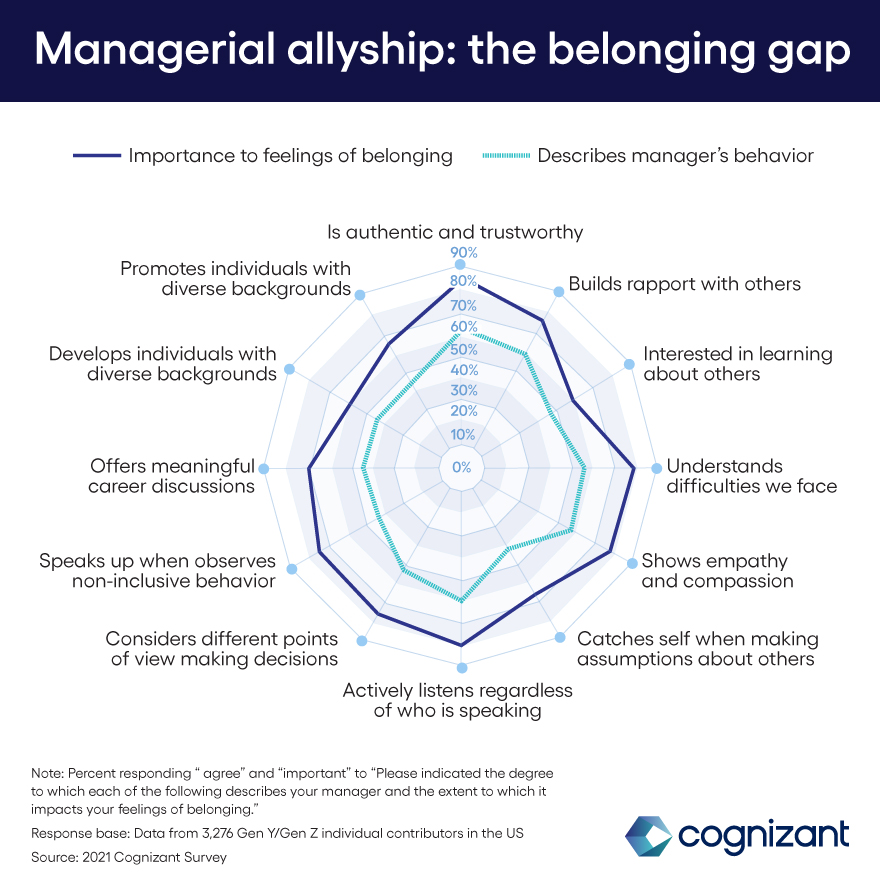July 14, 2022
How to create a ‘belonging’ superpower: managerial allyship training
Based on our research, equipping managers to act as allies should be top priority in any D&I strategy.
There are more than 11 million unfilled jobs in the U.S. alone. ManpowerGroup reports the largest talent shortages in 16 years. And according to Korn Ferry, 31% of employed professionals indicate they are thinking about leaving their jobs despite not having another one lined up.
While there’s no simple explanation for the talent shortage, it’s clear that simply cranking up the organization’s recruitment machine will not be enough. Even with the specter of a cooling global economy, the challenge in 2022 and beyond is retention. And that means building and strengthening individual relationships with existing employees.
Based on research we conducted in June 2021 of 3,000 individual contributors in the US, the most effective way to do that is by developing managers at every level. We found that manager behavior is the most significant driver of employee feelings of belonging. Inclusive managers create a pivotal connection between the individual employee and the organization, resulting in increased engagement, productivity, innovation and, ultimately, retention.
Key allyship behaviors
Unfortunately, according to Korn Ferry, only 5% of leaders globally are acting in an inclusive way. That’s why we also asked in our research what, specifically, do organizations need to equip managers to do?
Here’s what we found: While respondents told us that inclusive leadership encompasses a wide range of behaviors, the largest impact on their feelings of belonging occurs when managers act as allies in the workplace—someone who will stand up for, support and actively advocate for others who may be different from themselves.
However, our respondents also shared there is a critical performance gap. Managers are not exhibiting the behaviors that matter most: building relationships, understanding others, being self-aware, including others in the decision-making process, as well as standing up and speaking up for others.
One reason for this could, simply, be a lack of skills. In fact, Change Catalyst suggests that a lack of knowledge/skills/confidence, along with an unsupportive workplace, are primary drivers of the disconnect we identified in managerial allyship performance. In fact, while 70% of managers in Change Catalyst’s survey want their organization to do more to encourage allyship, only 14% have access to allyship training in their workplace.
Clearly, if organizations were to prioritize one action in a D&I strategy, equipping managers to act as “allies” would be it.
Developing managerial allyship skills
Cognizant has been on a journey to foster a culture of conscious inclusion by emphasizing the importance of allyship. Our instructor-led training program focuses on developing the specific skills our respondents identified as being important. At the core of these skills is action. As an ally, managers must make a concerted effort to act—to speak up and stand up when others do nothing.
In the program, we identify the simple, everyday efforts managers can take that make a difference, so that when managers exercise these skills, they become:
- Confidants. By seeking to know and understand others whose background and life experiences are different from their own, they create a safe environment for team members.
- Amplifiers. By listening to, valuing and amplifying marginalized voices, they make sure others are heard, respected and included.
- Upstanders. By speaking up when they see non-inclusive behavior, they correct wrongdoing. And by seeking regular, ongoing feedback about their own behavior, they learn and self-correct.
- Sponsors. By mentoring and developing team members through regular, meaningful, ongoing career discussions, they actively advocate for underrepresented colleagues.
Managerial allies also encourage their team members to act as allies, which helps to build a broader community of allies. At Cognizant, we support that effort by offering allyship training, in an e-learning format, to all our associates.
The journey starts with skill development
It takes knowledge, skill, confidence and courage to be an ally. It’s a conscious decision to make space for those who are not normally invited to fully participate. Managerial allyship is about creating a positive climate of psychological safety at the team level—one of the strongest proven predictors of team effectiveness. To create a high-performing team, employees need to feel comfortable sharing their ideas and opinions, asking questions, expressing concerns and disagreeing.
There is no doubt, allyship is a journey. But it’s time to work on closing the managerial performance gap, and training is an important first step. Investing in and scaling up development programs that equip managers, along with their team members, can have the strongest impact on employee feelings of psychological safety and belonging.
Moreover, organizations that place a strong strategic emphasis on developing managerial allyship skills can expect to reap the benefits of increased employee productivity and innovation.
Margaret Schweer is COO and Managing Principal of Tammy Erickson Associates, a firm committed to helping organizations develop a compelling view of the future, to discern and describe interesting trends, and provide actionable counsel.
margaret@tammyerickson.comLatest posts
Related posts
Subscribe for more and stay relevant
The Modern Business newsletter delivers monthly insights to help your business adapt, evolve, and respond—as if on intuition




